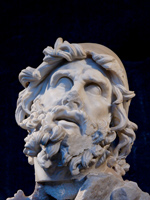jorge a. bosso
musician, composer, cellist
works_orchestra_

The Eternal Embrace
(après The Odyssey)
Tales for cello and orchestra (2004)
“ Her knees failed her,
her heart melted then and there she knew for truth
the undoubted tokens Odysseus gave her,
then she ran across to him,
and throwing her arms about his neck
she kissed him and began to speak…”
(The Odyssey, chapter XXIII)
| Chapter I | Hymn to Athene |
| Chapter II | Odysseus towards the unknown |
| Chapter III |
Phaecing games, dancing, poems (a song for Psyche…) |
| Chapter IV | Penelope’s mourning (solo viola) |
| Chapter V | Polyphemus |
| Chapter VI | Circe |
| Chapter VII | Odysseus among the ghosts |
| Chapter VIII | The Sirens’ chant and the cattle of the sun |
| Chapter IX | Odysseus’ mourning |
| Chapter X | Return to Ithaca – The contest of the bow |
| Chapter XI | Penelope doubts and believes |
| Chapter XII | Epilogue |
Instrumentation
Solo cello
2 Flutes (2nd doubling Piccolo)
2 Oboes (2nd doubling English Horn)
2 Clarinets in Bb
2 Bassoons
2 French Horns
Timpani
Percussion (bass drum, tam-tam-, triangle, cymbals, tubular bells, vibraphone)
Strings
Duration: 40 minutes ca.
Three movements, divided in twelve chapters, are the structure of the whole concert, that I conceived, to give life in music to one of most representative epic poems in the history of literature of all times.
Two are the main characters, Penelope (solo viola) and Odysseus (solo cello).
Chapter IV - Penelope’s mourning- and chapter IX - Odysseus mourning -, symmetrically disposed, close the nucleus, the core of the entire piece creating “The Eternal Embrace”.
An endless feeling, an infinite sentiment of belonging to somebody or to an idea of faithfulness represented by Penelope and her nostalgic desire for the man she still loves, and on the other hand, by Odysseus that cries on the seashore, in the island of Calypso, and wishes to come back to his land and to his beloved queen.
An embrace is a gesture of extreme tenderness and warmth, but at the same time a sign of enormous inner strength, and it is this motion and action that give me the transcendental essence of the entire poem.
It is, for me, the culmination of the adventures of Laertes’ son this precise moment: the instant in which Penelope doubts and the moment in which she believes. It is this final recognition that confers a deeper identity on both of them, her individuality through his uniqueness.
Jorge A. Bosso